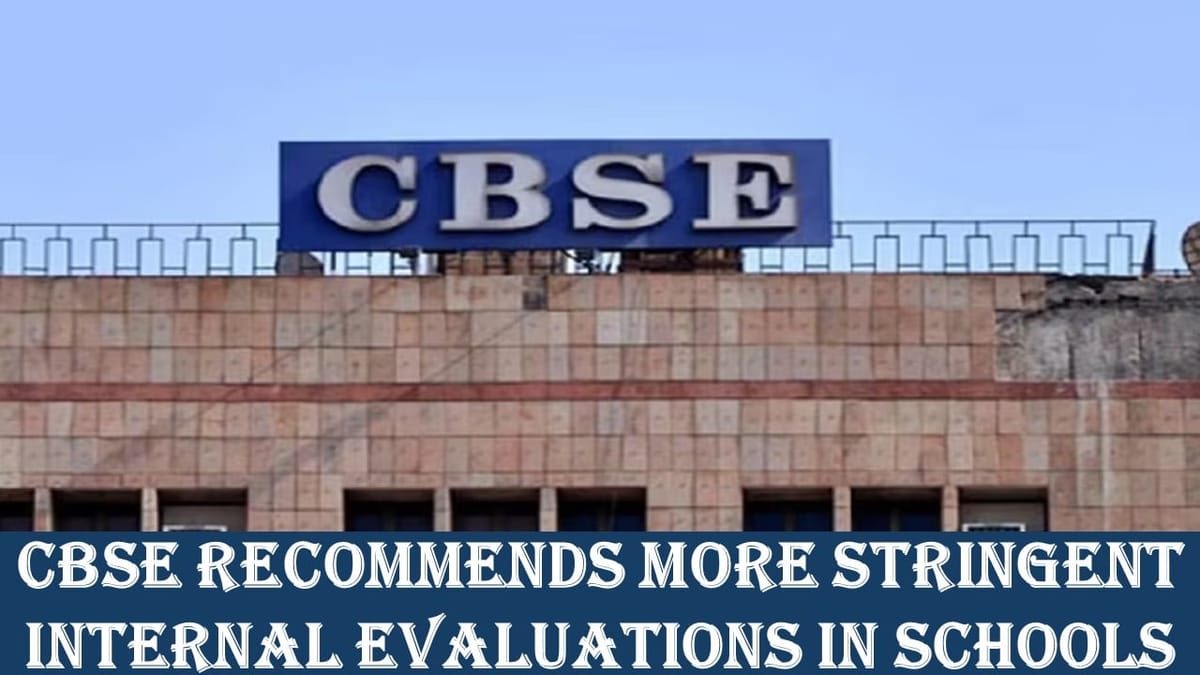In order for external examiners to assess students' performance in practical exams, schools must grant them autonomy.
Shubhra Goswamy | Jun 18, 2024 |

CBSE Recommends More Stringent Internal Evaluations in Schools to Reduce Inconsistencies Between Theoretical and Practical Grades
Recently, schools received a recommendation from the Central Board of Secondary Education (CBSE) asking them to review their internal assessment processes. This follows the discovery of a notable disparity between the theoretical and practical exam results for classes X and XII across more than 500 schools. It was noted that a large number of students receiving full scores in practical evaluations were those who performed poorly in theory examinations.
“The variation emphasizes the necessity of careful evaluation during in-class practical exams”. The CBSE circular stated that the advisory’s goal is to “implement a more robust, transparent, and reliable mechanism to ensure that the assessment process is realistic and adds substantial value to the students’ academic journey.”
Under the condition of anonymity, a CBSE official states, “We have data records related to all theory and practical marks for both classes X and XII.” Disparities in the assessment process can be found if all 40 students in a class receive full marks in the practical but only a small number receive good theoretical grades.
He states that the advice has been provided by the board previously and that the CBSE carries out this exercise annually. “Many schools give more marks to students in practical exams in an attempt to get good scores,” he explains. A student will pass the test using practical marks even if they have low theoretical points. This maintains the reputation of the school while improving overall results.
While determining the practical marks, teachers and the school administration should uphold consistency and ethics. He claims that “teachers frequently use mark inflation to save their jobs,” and that “these discrepancies affect the morale of the bright students who, in spite of their hard work, are positioned together with the non-deserving students.”
“There are some guidelines in place, but authorities are trying to build a more comprehensive assessment system so that these inconsistencies do not exist,” the senior official continues. The CBSE will make an effort to raise awareness in the classrooms.
According to former Delhi government school administrator Sangeeta Jay, “Students often perform better in familiar environments.” A student feels at ease in a school because of their surroundings; when taking an internal assessment, they are surrounded by their instructors and friends and there are no outside agencies or external examiners involved. Thus, for this reason, about 30–40% of students do well. However, students may experience anxiety in a new setting when they appear for their boards, for which they must travel to various locations to complete the papers. Students may do poorly as a result of this.
She also emphasizes the fact that while some students may struggle academically, they generally behave well in class, show up on time, and uphold the values and ECA. “Some first-generation students receive higher practical scores due to humanitarian reasons,” the speaker notes. She also notes that some students believe they don’t need to work hard in class because their teachers will reward them with good marks in practical exams, which will improve their overall performance. Long-term effects of the process include an impact on their academic achievement. There is often a state of compromise since both the instructor and the school must demonstrate outcomes, Jay continues.
To encourage students to put forth consistent effort, a system of relative connectivity—that is, linking practical marks with unit tests and half-yearly exam performance—must be implemented. Students will be encouraged to perform better by this strategy because they will understand that receiving good marks on these examinations is a prerequisite for receiving good marks on practical assessments. Additionally, attendance ought to be noted, says Jay.
“The CBSE always calculates the relation between practical and theory marks,” says Shanti Krishnamurthy, director of Chinmaya Mission’s Education Cell, describing it as an important measure. The CBSE has always conducted business in this way. Discrepancies can be found with a straightforward calculation or subject-to-subject correlation.”
“Educators need to prepare plans and guarantee that the external examiner has total autonomy in assessing students’ success in hands-on experiments. During the practical, this is one method to guarantee careful evaluation. No instructor consultation should be required before assigning marks. According to her, the CBSE ought to emphasize this as well.
In case of any Doubt regarding Membership you can mail us at [email protected]
Join Studycafe's WhatsApp Group or Telegram Channel for Latest Updates on Government Job, Sarkari Naukri, Private Jobs, Income Tax, GST, Companies Act, Judgements and CA, CS, ICWA, and MUCH MORE!"